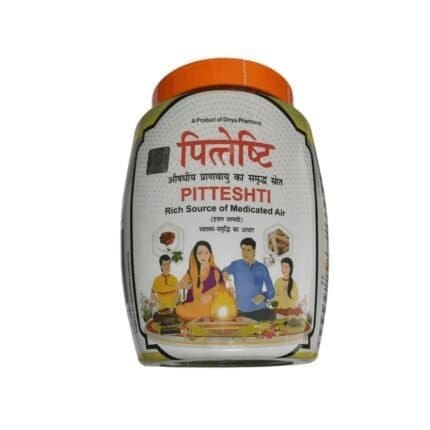Patanjali Divya Pitteshti(Hawan Samagri)
Patanjali Divya Pitteshti(Hawan Samagri) is a type of “Hawan Samagri,” which refers to a mixture of various herbs, woods, and other natural substances used in Hindu rituals and ceremonies, particularly in the practice of “havan” or fire rituals. These rituals are an integral part of Hindu culture and spirituality.
“Patanjali Divya Pitteshti(Hawan Samagri)” might be a specific blend of ingredients designed for a particular purpose or to invoke specific energies during the ritual. It’s important to note that the exact composition and purpose of a specific “Patanjali Divya Pitteshti(Hawan Samagri)” blend might vary, and it’s best to refer to the product packaging or official sources for accurate information.
Patanjali Divya Pitteshti(Hawan Samagri) Benefits:
- Purification: Patanjali Divya Pitteshti(Hawan Samagri) smoke produced during the havan is considered to have purifying properties. It’s believed that the fire purifies the atmosphere, the offerings, and the participants themselves.
- Positive Energy: The recitation of Vedic mantras during the havan is thought to generate positive vibrations and energies. This is believed to create a harmonious and spiritually uplifting environment.
Patanjali Divya Pitteshti(Hawan Samagri) To be Used:
- Health and Wellness: Different herbs and substances used in Patanjali Divya Pitteshti(Hawan Samagri) might have traditional associations with health and well-being. For example, some herbs are believed to have antimicrobial properties.
- Connection with Deities: Havan rituals are often performed as an offering to deities and cosmic forces. Patanjali Divya Pitteshti(Hawan Samagri) believed that the offerings are received by the deities, strengthening the connection between the practitioner and the divine.
- Spiritual Growth: The act of performing a havan with sincerity and devotion is considered spiritually enriching. It’s seen as a way to cultivate a deeper connection with one’s higher self and the spiritual realm.
- Cleansing Negative Energies: Havan rituals are believed to dispel negative energies and influences,
Patanjali Divya Pitteshti(Hawan Samagri) How to Use:
Procedure:
- Setting Up the Havan Kund:
- Choose a clean and well-ventilated area outdoors for the havan.
- Set up the Havan Kund (fire pit) in a safe and stable location. Place dried cow dung cakes at the bottom of the Kund as kindling.
- Preparation:
- Arrange all the materials you’ll need near the Havan Kund.
- Have ghee, camphor, and dried coconut pieces, Patanjali Divya Pitteshti(Hawan Samagri) ready for offering.
- Purification:
- Begin by purifying yourself. This can involve sprinkling water on your hands and face.
- Igniting the Fire:
- Light the dried cow dung cakes using matchsticks or a lighter. Recite a specific mantra or prayer
- Offerings:
- the fire starts to burn, add small sticks to keep the fire going.
- Begin offering small amounts of Patanjali Divya Pitteshti (Hawan Samagri) into the fire while reciting mantras or prayers.
When to Use:
- New Beginnings: Havans are often conducted to inaugurate new ventures, such as starting a new business, moving into a new home, or beginning a new phase of life.
- Weddings: Havan rituals are an integral part of Hindu weddings. Patanjali Divya Pitteshti(Hawan Samagri) are performed to invoke blessings for the couple and their married life.
- Birthdays and Anniversaries: Some individuals choose to perform havans on special occasions like birthdays or marriage anniversaries as a way to seek blessings and express gratitude.
- Purification: Havans are considered to purify the environment, both physically and spiritually. They are performed to cleanse negative energies and promote positive vibrations.
And always remember ,before trying any new remedies for supplements, consult with our Kapeefit Ayurvedic practitioner or a healthcare professional. Your wellness journey is our priority.




Reviews
Clear filtersThere are no reviews yet.